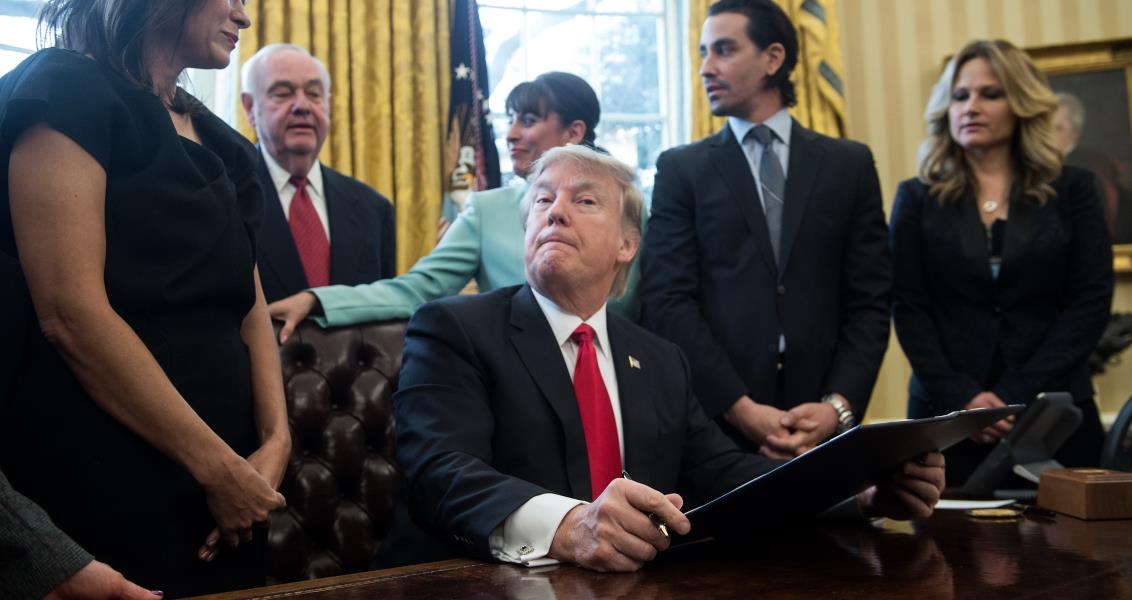
Trump and 'Difficult Transitions'
Relations between the Trump team and the media may further sour in the coming days. The international system and regional crises are also not making Trump's job easier.
Share
The change of power from a leader to another is always a risky process full of possible disasters and interruptions to the normal organizational work flow. Leadership changes always require patience, perseverance, attention and diligence on the part of the new leadership and the rest of the organization. When the leadership change takes place in an organization that resembles "a state," with a complex bureaucracy and intricate network of relations, it is usually much trickier. Such changes are difficult for a political party, as a group of new decision makers take control of a huge machine. Every step of this process entails the risk of mismanagement, misunderstanding and miscommunication between the incoming senior leadership and the bureaucracy.
Of course, when this transition takes place in a country like the United States, it becomes more important than anybody can imagine. The first days of a new president, especially when he or she is from a different party, is full of potential problems and crises. In particular, the number of potential risks increase dramatically with the learning process involved in running the foreign relations of a superpower.
The first days for U.S. presidents have historically been full of crises and challenges. The Bay of Pigs incident, which was one of the biggest fiascoes in covert operational U.S. history, took place in the first days of the John F. Kennedy's presidency. Although he managed the crisis well by taking full responsibility for the problems in the operation, it nevertheless remained a stain on the U.S.'s record and a problem for future operations. Also, the EP 3 plane crash that rocked relations between the U.S. and China took place in the first days of the Bush presidency. The Apology crises that took place in the aftermath of the crash of the U.S. surveillance plane with the Chinese jet, which led to the death of the Chinese pilot and the landing of the U.S. plane, without permission, on Hainan Island, would likely have been better handled had it not occurred in the first days of George W. Bush's presidency. Any new president and his team make a steep learning curve when it comes to the handling of crises during the first days in office.
In 2008, while President Barack Obama was running for the presidency with a sizable margin in the public opinion polls, two experienced foreign policy makers in the U.S. with close ties to the Democratic Party wrote a book about this challenging process for new presidents. The main theme of the book was to prepare presidents to adjust to crisis-driven international politics. They highlight significant potential challenges for new presidents during their first few months in office, such as appointing second and third tier positions in foreign and security policy of the state, fixing Congressional relations, dealing with the legacy of the previous administration, managing crises and dealing with the press.
In their book, they also provided the new administrations different recommendations, including "defer decisions, when possible, until confident of the facts - while recognizing that there will often be gaps in information" and "expect and plan for confusion and disorder at the outset" in order to handle these challenges.
Of course, regardless of these now often-cited and frequently debated recommendations, there are always unknowns and risks for any new administration. The Trump administration is experiencing and will experience these challenges in their "honeymoon" period. In addition to taking over power from a president that belongs to another party, the new team must also face difficulties that stem from the splits among the foreign policy experts of the Republican wing. The current state of vacancies at the senior levels of the administration will take maybe months to fill under these circumstances.
Furthermore, relations between the Trump team and the media may further sour in the coming days. The international system and regional crises are also not making Trump's job easier. There are disappointed allies and failed states in the Middle East, a significant threat of escalation and competition in the South China Sea, a confused Europe, a neglected Africa and a challenging Russia for the Trump administration. On top of that, there are significant transnational threats, such as terrorism and new types of security risks, such as cyber threats. Under these circumstances, the real test for the new president and his team may occur in the significant foreign crises that they face. Major foreign powers, particularly China and Russia, as well as other actors will try to see what reactions the Trump administration make under stress. Any decision the new administration makes in these first days of office may have far-reaching consequences. Any mistakes may trigger irreversible problems and issues in the coming months and years, in both domestic and foreign policy.
[Daily Sabah, January 28, 2017 ]
Tags »
Related Articles






